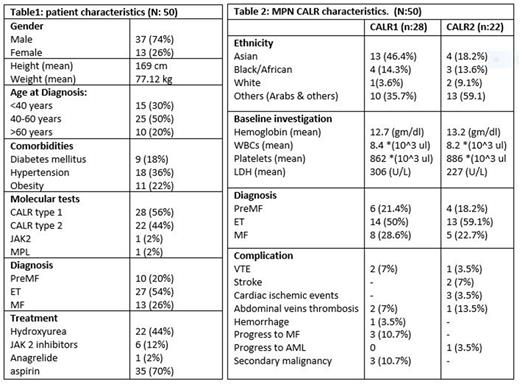Abstract
Background:
Myeloproliferative neoplasms (MPN) are a collection of acquired hematological illnesses caused by genetic errors in myeloid cell lines. They are defined by the abnormal production of one or more myeloid cell lines. PV (Polycythemia Vera), ET (essential thrombocythemia), pre-PMF (primary myelofibrosis), and PMF are all Philadelphia negative and commonly associated with thrombosis, splenomegaly, or detected during normal blood tests. Since 2013, somatic mutations in the calreticulin gene (CALR) with insertions or deletions have been found in two Philadelphia chromosome (Ph)-negative myeloproliferative neoplasms (MPNs), (ET), and (PMF). CALR mutations have also been found infrequently in chronic myelomonocytic leukemia (CMML).
Calreticulin recurrent mutations are seen in 20% of patients with (MPNs). Our goal is to identify the various types of CALR mutations and their impact on CALR-positive MPN patients' clinical manifestations and outcomes.
Methods:
A single-center retrospective study was conducted. The data was collected from pre-existing records. The study was carried out on Philadelphia-negative MPN patients who were being followed up on at the NCCCR (National Center for Cancer Care and Research) to assess the clinical manifestation and outcome of disease treatment. All patients included, were followed in our center between January 1, 2008, and November 20, 2021. (Around 100 patients were screened to be included in this study.
Participants:
-Adult patients aged >= 18 years old, diagnosed with Philadelphia negative MPN (ET, PV, PMF, Pre-PMF) according to the 2008 and 2016 WHO criteria,
-All patients are residing in the State of Qatar, with regular follow-up in the National Center for Cancer Care and Research.
Inclusion criteria
1-Adult patients aged >= 18 years old, diagnosed with Philadelphia negative MPN (ET, PV, MF, PMF) according to 2008-2016 WHO criteria
2-Patients who tested positive for any of the CALR mutations
Exclusion criteria
MPN patients with other genetic mutations
Patient with Philadelphia positive MPN
Results:
A total of 50 patients with CALR-positive MPN were reviewed, with a median follow-up of 3 years (1-11). 27 (54%) patients were diagnosed with essential thrombocytosis (ET), 13(26%) patients with myelofibrosis (MF), and 10 (20%) patients with pre-myelofibrosis (preMF). 37 (74%) were male and 13 (26%) were female. 15 (30%) patients were diagnosed before the age of 40, 25 patients (50%) between the ages of 40 and 60; and 10 (20%) after the age of 60. Molecular analysis showed 28 (56%) patients with CALR type 1, 22 (44%) patients with type 2 mutations, and 2 patients with double mutations: 1(2%) with JAK2, and 1(2%) with MPL mutation. 22 (44%) patients were treated with hydroxyurea, 6 (12%) with JAK2 inhibitors, and 1(2%) with anagrelide. 35 (70%) were given anti-platelet. 3 (6%) patients developed venous thromboembolism mainly with CALR 1, 2 (4%) from stroke, and 3 (6%) from ischemic cardiac events. Stroke and cardiac ischemic events, mainly in CALR 2 patients. 3 (6%) from abdominal vein thrombosis and 1(2%) from hemorrhage. 3 (6 %) patients progressed to myelofibrosis with CALR 1, while 1 (2%) progressed to AML with CALR 2. Secondary pregnancy was seen mainly in patients with CLAR1 mutations.
Conclusion:
Data suggestive of the higher incidences of the young population diagnosed with CALR positive MPN, raising the need for a better scoring/ assessment tool for such population, possibly to control the disease burden by decreasing the incidents of disease progression and or developing thrombotic/Hemorrhagic complications.
Disclosures
No relevant conflicts of interest to declare.
Author notes
Asterisk with author names denotes non-ASH members.


This feature is available to Subscribers Only
Sign In or Create an Account Close Modal